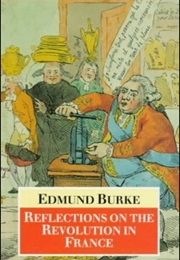

(He also supported Irish independence from Britain.) In Burke's eyes, British and American revolutionaries had exercised their "inherited" rights and liberties as British subjects, and they had worked within British traditions and institutions. He, for example, supported both the British Glorious Revolution of 1688-89 and the American Revolution. Although Burke supported ideas and institutions later associated with Metternich's conservatism, he also took positions that most conservatives would have disavowed. His most famous work, Reflections on the Revolution in France, was written in the form of a letter to a French friend. He wrote books on philosophy, history, and political theory. At the age of 37, he was elected to the House of Commons. Readers trust the series to provide authoritative texts enhanced by introductions and notes by distinguished scholars and contemporary authors, as well as up-to-date translations by award-winning translators.Excerpts from the Original Electronic Text at the web site of the Eris Project at Virginia Tech.īorn in Ireland, Edmund Burke as a young man moved to London where he became a journalist and writer. With more than 1,700 titles, Penguin Classics represents a global bookshelf of the best works throughout history and across genres and disciplines. He highlights Burkes brilliant grasp of social and political forces and discusses why the book has remained so significant for over two centuries.įor more than seventy years, Penguin has been the leading publisher of classic literature in the English-speaking world. Reflections on the Revolution in France is now widely regarded as a classic statement of conservative political thought, and is one of the eighteenth centurys great works of political rhetoric.Ĭonor Cruise O∫riens introduction examines the contemporary political situation in England and Ireland and its influence on Burkes point of view.

A scathing attack on the revolutions attitudes to existing institutions, property and religion, it makes a cogent case for upholding inherited rights and established customs, argues for piecemeal reform rather than revolutionary change and deplores the influence Burke feared the revolution might have in Britain. To make a revolution is to subvert the ancient state of our country and no common reasons are called for to justify so violent a proceedingīurkes seminal work was written during the early months of the French Revolution, and it predicted with uncanny accuracy many of its worst excesses, including the Reign of Terror.


 0 kommentar(er)
0 kommentar(er)
